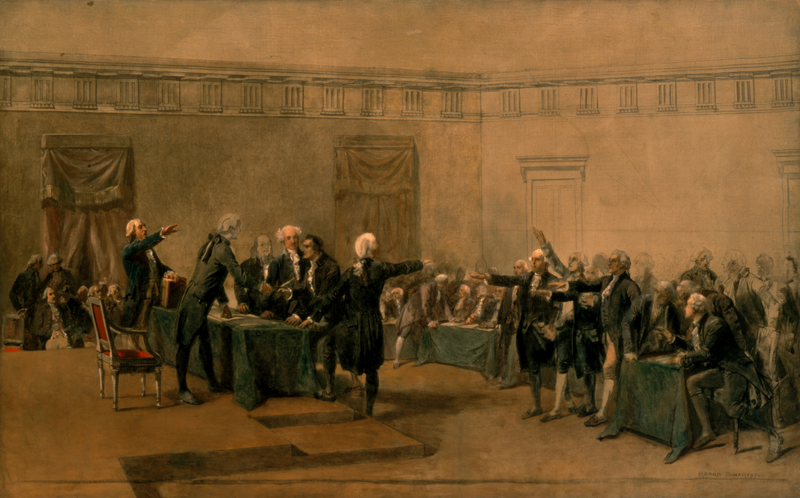Democracy and despotism in a digital age.
The Dangerous Case of Bandy X. Lee

Too often, experts who are working to "save American democracy" are doing anything but.
The former Yale psychiatry professor Bandy X. Lee spent the four years of the Trump presidency trying to convince Congress to remove him from office on mental health grounds. She was not the only shrink advocating the president’s removal, whether via special congressional committee or the invocation of the 25th Amendment (which removes power from the president if he is unable to perform his duties). But she was far and away the most prominent. She convened a notorious Yale conference on the presidential wits in early 2017 that resulted in a diagnostic book of that year called The Dangerous Case of Donald Trump.
Having failed to convince elected leaders to enact her agenda through, as she called it, “the [Mueller] special counsel’s report, impeachment, or the 25th Amendment,” she told the Mark Levin Show in 2019 “my last resort is to be a service to the public.” That meant launching a campaign to remove President Trump via the administrative declaration of a public health emergency that would suspend democratic rights nationwide due to what she called a “Trump mental health pandemic.” Although she rejoiced that “the healthy part of the population” won the 2020 election, making the emergency declaration unnecessary, the reprieve was temporary. It was urgent, she said, that Congress enact special measures to prevent anyone of Trump’s ilk from gaining office again given that half of the national electorate was, in her view, unfit to vote.
On June 20, Lee lost her appeal in federal court against a lower court ruling that upheld Yale’s decision of 2020 not to renew her courtesy appointment as a clinical professor. The reasons for the Yale decision are both technical and substantive. Lee was not a regular faculty member, so she could not appeal to academic freedom or even full-time employment protections. She had become a nuisance at Yale because of her repeated violations of the basic rule of psychiatry, namely that one should examine a “patient” before delivering a diagnosis, even if they are a public figure.
As the Foundation for Individual Rights and Expression, which supported Lee, admitted in a report on the case, “Yale is a private institution, and is free to privilege other values above free speech and academic freedom.” Indeed, in this case, it prioritized the damage to the institution of hosting a nuisance professor who had violated the professional ethics of her discipline and impugned not just the president but every Yale student, faculty, staff member, or alumnus who supported him—the most famous of whom was lawyer Alan Dershowitz. Lee often noted that her courtesy appointment at Yale was critical to her business model of leveraging the Yale brand for her private practice. Yale was right to say: “All things considered, no thanks.”
But there is a bigger threat that, thankfully, was defeated with the federal court’s decision. Lee’s advocacy against Trump represented a dangerous attempt to subvert American democracy with recourse to the scholarly opinions of credentialed experts. Her campaign was a potent, and potentially infectious, instance whereby academics and research specialists, having spent too much time in like-minded fora, reach the conclusion that their insights and agendas can no longer brook the shackles of democratic procedure. With Lee’s defeat falls a whole philosopher-guardian model that, far more than the yahoos scaling the Capitol complex on January 6, represented an imminent threat to American democracy.
A similarly anti-democratic ethos that afflicted many academic psychiatrists during the Trump era crept into the officially bipartisan National Endowment for Democracy. Like the mind-healers of The Dangerous Case of Donald Trump, the specialists in global democracy at the NED unexpectedly came out swinging against the legitimacy of a duly-elected president, suggesting that American democracy was “broken” and on the road to fascism. This from a group of experts who regularly globe-trot to countries with contentious elections, counseling both sides to tolerate their opponents.
One can cite numerous other domains where academics and experts have declared democracy to be an obstacle to existential problems. Climate change requires a dictator. Racial justice requires stacking the Supreme Court. Public education requires silencing parents and elected school boards. Affirmative action requires administrative workarounds of legislative intent. Persistent white conservatism requires the mass illegal migration of socialist-leaning Latinos.
All these anti-democratic movements have their expert enablers. Bandy X. Lee was dangerous not just for her explicit attempts to deploy her expert opinion for illiberal ends. More ominously, mainstream liberal media exalted her as an anti-democratic role model as if it was the most natural thing. She told Bill Moyers on his podcast On Democracy after Biden’s inauguration that she wanted Congress to “consider consulting with us and to work on immediate removal [of Trump from public life] as well as immediate guardrails” to prevent others like him from ever reaching office again, including via “involuntary psychiatric evaluation.”
If there was a moment when the secret anti-democratic sentiments of the American academic and scholarly establishments threatened to go mainstream, it was Bandy X. Lee. But adherents to democracy should not rest complacent. Lee’s mindset reflects a growing drift in the American elite from the core English liberal values on which this nation was founded. These include respect for the common man, the rule of law, constitutionalism, fair play, formal equality of political and legal status, and unconstrained speech and debate. In a lengthy analysis of Lee in 2021, I attributed the illiberal (and very un-English) content and style of her anti-Trump advocacy in part to the distinctly Korean cultural phenomenon of minjung millenarianism. In a nutshell, this ethos elevates everyday challenges of a plural society into world-historical evils threatening mankind which can be scotched only by the timely intervention of scholar-sages who descend from their contemplation in the mountains to correct the vices and immorality of the masses.
After my article was published, Lee wrote to the journal demanding that the article be removed and threatening a lawsuit. The editors demurred but invited her to submit a letter or a response article. She declined, saying the article was not worthy of a response. She then said she was part of a group of academics planning a class-action suit against conservative publications that criticize the behavior of academics like herself. We have heard nothing since.
What is remarkable about Lee then is, having put herself into the public sphere as a defender of democracy against crazy people, she turned out to be one of the most anti-democratic screwballs the American public has witnessed in a long time.
American pluralism demands a fidelity to and rallying behind American democracy more than ever. That democracy faces cultural challenges from non-Anglo cultures that never quite buried their anti-democratic urges. It also faces professional cultures, especially in the academy and research specialisms, that likewise have hewn to totalitarian tendencies rather than democratic ones.
This should worry everyone. We might dismiss the dangerous case of Bandy X. Lee as an amusement rather than an alarm. We know that all is not well in the house of American thought leaders.
The American Mind presents a range of perspectives. Views are writers’ own and do not necessarily represent those of The Claremont Institute.
The American Mind is a publication of the Claremont Institute, a non-profit 501(c)(3) organization, dedicated to restoring the principles of the American Founding to their rightful, preeminent authority in our national life. Interested in supporting our work? Gifts to the Claremont Institute are tax-deductible.
Part I: Unfettered reason cannot conserve anything.
One dose will erase your whole political mind.






